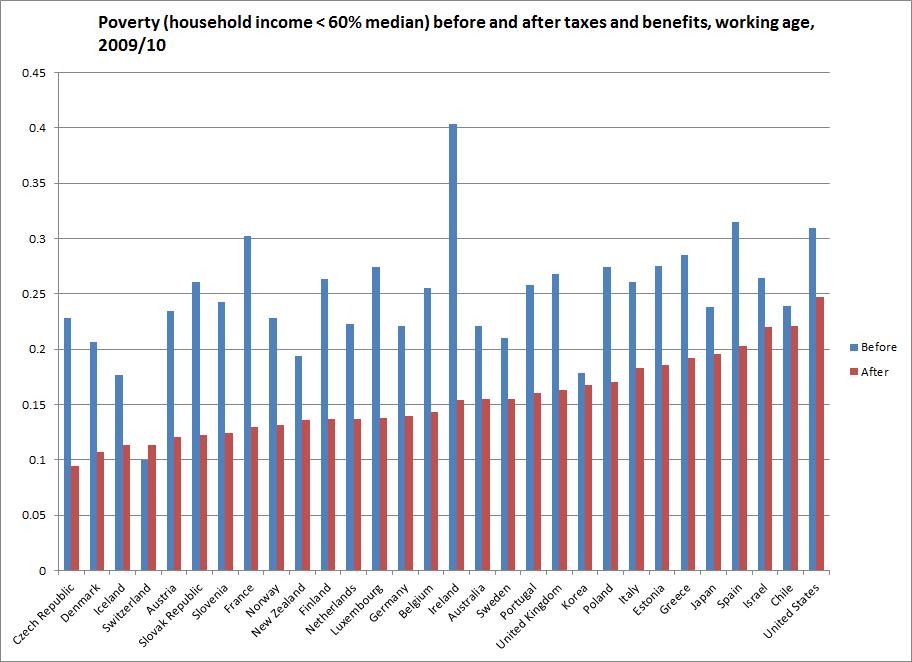Is charity doing more to tackle poverty than government?

In an otherwise well-argued article http://www.independent.co.uk/voices/comment/poverty-is-the-defining-prob..., Andreas Whittam Smith asserts that in the face of rising poverty, the charitable endeavours of ordinary citizens 'are almost certainly doing more to alleviate the problem than the Government'. He goes on to say '..we have two remarkable things going on, not one. There is the ever-growing crisis of poverty. And in response there is the ever-growing involvement of civil society in dealing with the consequences. Politicians can only look on. Here and there they get small initiatives under way. Otherwise, nothing.'
This is a great example of how easy it is even for intelligent, concerned and well-informed commentators to slip into arrant nonsense when it comes to inequality and poverty.
The chart at the top of this article shows two things. The first (the blue columns) is what poverty would be like for people of working age if there were no redistribution through taxes and benefits, for the OECD nations where this data is available. Figures are for either 2009 or 2010 depending on availability (the larger value of the two where there is data for both years). Most countries show a pre-tax poverty rate between 20% and 30%.(Ireland I regret to say is an outlier with pre-tax poverty of 40%.) The UK is towards the higher end of the range, but it is the similarities rather than the differences between nations that are most striking. Pre-tax poverty is a pervasive feature of OECD economies.
The second (the red columns) is what poverty looks like after redistribution. Apart from Chile, Korea and Switzerland, all countries substantially reduce working age poverty**. In the UK, poverty falls from 26% to 15%. Countries vary a lot in their poverty reduction effort, and in the efficiency of transfers in reducing poverty. (I recommend this excellent new report http://www.esri.ie/UserFiles/publications/BKMNEXT248.pdf from the Economic and Social Research Institute in Dublin: the charts on p.85 show how effective and how efficient different EU countries are in reducing poverty.) The UK is among the more efficient, as noted here before http://lartsocial.org/nothingless. We might prefer to see more poverty reduction, either through more generous transfers or more effective transfer policies, but the impact of government on poverty is certainly not 'nothing'.
Income transfers to working age households in the UK amount to about £100bn, while charitable donations for all purposes from individuals came to less than a tenth of this in 2012 at £9.3bn https://www.cafonline.org/PDF/UKGiving2012Summary.pdf . So the idea that private chartity is doing more to tackle poverty than government would be patently ridiculous, even if we thought most charitable giving was directed to reducing UK poverty, which of course it isn't (for example, medical research, hospitals and religion account for nearly half of all donations). And the assertion that politicians 'can only look on' while the usual suspects (globalisation, technological change) wreak devastation on living standards and equality ignores the role that political choices play. The impact of coalition policy on poverty should be uncontroversial. In 2011, the eminently non-partisan Institute for Fiscal Studies pointed out 'In 2013, our projections suggest that coalition reforms increase both relative and absolute poverty by about 300,000 children and 100,000 working-age adults without dependent children ... The reforms explain virtually all of the predicted rise in absolute poverty between 2012 and 2013.' ('Absolute poverty' is poverty measured against a fixed income threshold, the median in 1998/9). Governments do a lot to reduce poverty, but some do more than others and some, like the coalition, do less.
None of this is intended to downplay the role that civil society can and should play in tackling social problems, just to put things in perspective. The resources in cash or in kind generated by charity are simply not on a scale to compensate for cuts to poverty reduction through taxes and benefits. And one of the unsung advantages of the welfare state is that by relieving private charity from the lion's share of responsibility for dealing with poverty, it allows it to direct resources to things where the state may be less effective. Food banks strike me as a singularly inefficient and inappropriate use of charitable funding and goodwill. Better the state ensures we don't need them, as it easily could, so that civil society can concentrate its efforts on more productive endeavours.
*Data from OECD here http://www.oecd.org/els/soc/income-distribution-database.htm
**Take the Swiss data with a grain of salt. I've only included it for completeness sake.